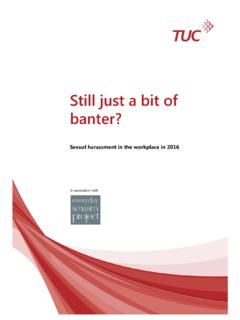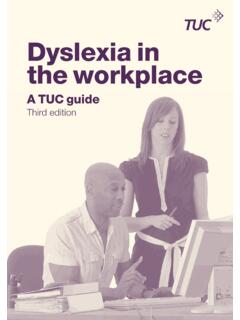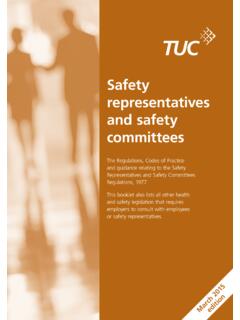Transcription of Breaking Point: the crisis in mental health funding
1 Breaking Point: the crisis in mental health funding .. Contents Contents .. 2 Foreword .. 3 Introduction .. 4 Systemic underfunding in mental health services .. 6 Staffing crisis .. 7 Impacts on capacity and access to services .. 8 Impacts on patients and staff safety .. 14 What we need .. 16 Appendix 1 .. 17 With thanks to health Campaigns Together and the NHS Support Federation Trades Union Congress Congress House, Great Russell Street, London WC1B 3LS 020 7636 4030 For more copies call 020 7467 1294 or email Please ask if you need an accessible format. Foreword at the Spending Review next year we will set out our approach for the future. Debt as a share of the economy will continue to go down, support for public services will go up.
2 Because, a decade after the financial crash, people need to know that the austerity it led to is over and that their hard work has paid off. Prime Minister Theresa May, Conservative Party Conference, October 2018 The spending review process that will take place over the coming months is a crucial moment for our country. In the decade since the financial crash, day to day spending on running our public services as a share of GDP has been slashed to its lowest level since the late 1930s. Successive Conservative-led governments have pursued a self-defeating policy of austerity that has hampered our economic recovery and left large parts of our essential public services at Breaking point. From prisons to local government, from our schools and colleges to adult social care, we have services operating on a shoestring, under-staffed and over-stretched.
3 The dedication and professionalism, not to mention the countless hours of unpaid overtime, provided by our public sector workers have kept services going in sometimes impossible situations. Public sector workers who are earning thousands less in real terms than they were a decade ago due to a punitive pay cap imposed by the Treasury. Nowhere is this crisis more real than in our mental health services. As this report shows, years of real-terms spending cuts have left services unable to cope with growing demand. Beds, doctors and nurse numbers are falling while the number of patients accessing services continues to escalate. And the recent announcement of extra investment in mental health services falls short of promises it is just enough to maintain a status quo that is currently failing far too many people in need.
4 This is exacerbated by cuts to local authority and school budgets that are decimating counselling and public health services that are crucial to addressing mental health and wellbeing in our communities, particularly for our children. We need a whole system approach to the mental health crisis . And this can only come with meaningful and sustainable investment in the NHS, adult social care, local authorities and public health and in our schools and colleges. And despite extra cash for the NHS, the 2018 budget doesn t undo the austerity that has devastated our health services. The current public spending forecasts imply that cuts to other public services including schools and local authorities, will remain in place. If, as she claimed in her conference speech, Theresa May gets it then this must be reflected by spending decisions that her Chancellor makes in coming months.
5 More of the same will not do and warms words alone are meaningless without the investment that will enable us to provide the world class public services our communities desperately need. Frances O Grady General Secretary, Trades Union Congress Introduction One in six (17 per cent) of the English population aged between 16 and 64 met the criteria for common mental health disorders in Physical and mental health are closely linked people with severe and prolonged mental illness die on average 15 to 20 years earlier than other people. But only around a quarter of those with a common mental health condition receive In 2014, NHS England committed to working towards a more equal response across mental and physical health and achieving genuine parity of esteem by 2020.
6 Parity of esteem is defined as valuing mental health equally with physical health . According to the Royal College of Psychiatrists, it means equal access to the most effective and safest care and treatment, equal efforts to improve the quality of care, the allocation of time, effort and resources on a basis commensurate with need, equal status within health care education and practice, equally high aspirations for service users and equal status in the measurement of health outcomes .3 This report looks at the impact that years of under- funding have had on the quality, safety and capacity of mental health services. The primary focus is on the impact of the prolonged squeeze on NHS funding , but services that promote good mental health and wellbeing in our communities are also highly dependent on local authorities, schools, colleges and other bodies that have been subject to even more damaging spending cuts.
7 To fully understand the crisis in mental health , we need to acknowledge the impact that austerity has had across our public services and the challenges that this poses for developing a systemic, cross-public sector approach to address the mental health needs of our communities. Staff teams are stretched to Breaking point in mental health and referral rates are increasing whilst NHS and third sector resources are dwindling dramatically. Patients needs are more complex now than ever before and more time and space is needed to meet these safely and effectively. Buildings are being sold off to private buyers leaving fewer and fewer community bases and services are being redesignated to suit the estate provision not the needs of the population. I have feelings of despair and fear for the future.
8 CBT Nurse Psychotherapist, Yorkshire Increasingly there is a cliff edge for people with more complex or severe mental health problems in being able to access specialist talking therapies. Clinical Psychologist, oxfordshire 1 NHS digital (2016). Adult Psychiatric Morbidity Survey: Survey of mental health and Wellbeing, England, 2014 2 NHS England (2016). The Five Year Forward View For mental health 3 The Royal College of Psychiatrists (2013). Whole-person Care: from rhetoric to reality (Achieving parity between mental and physical health ) In the 2018 Autumn budget it was announced that the NHS was set to see its funding increase by in 2023 24. And that budget for mental health services will grow as a share of the overall NHS budget over the next five years.
9 4 According to the Treasury, this represents an increase in spending by more than 2bn by 2023 The budget gives us some details on how the money will be spent: The NHS will invest up to 250 million a year by 2023-24 into new crisis services, including: 24/7 support via NHS 111; children and young people s crisis teams in every part of the country; comprehensive mental health support in every major A&E by 2023-24; more mental health specialist ambulances; and more community services such as crisis cafes. The NHS will also prioritise services for children and young people, with schools-based mental health support teams and specialist crisis teams for young people across the country. For adults, the NHS will expand access to the Individual Placement Support programme to help those with severe mental illness find and retain employment, benefitting 55,000 people by 2023-24.
10 6 But the current funding commitments to mental health are insufficient to meet demand. In their analysis of the 2018 budget, the health foundation notes that Extra investment in mental health services will see funding grow broadly in line with the total health budget but this will mean simply maintaining the status quo which sees just 4 in 10 people who need it receive mental health support. To see some improvement, with provision increasing to 7 in 10, the service would need an extra on top of what the chancellor has announced. 7 4 Budget 2018 (2018). Documents 5 Budget 2018 (2018). 24 Things You Need To Know 6 Budget 2018 (2018). Documents 7 health Foundation (2018). Response to the Autumn Budget 2018 Systemic underfunding in mental health services Clinical commissioning groups (CCGs) in England spent ( 171,6 spend per head) on mental health in 2017 18, representing per cent of overall CCG In addition, NHS England spent directly on specialised mental health services.





